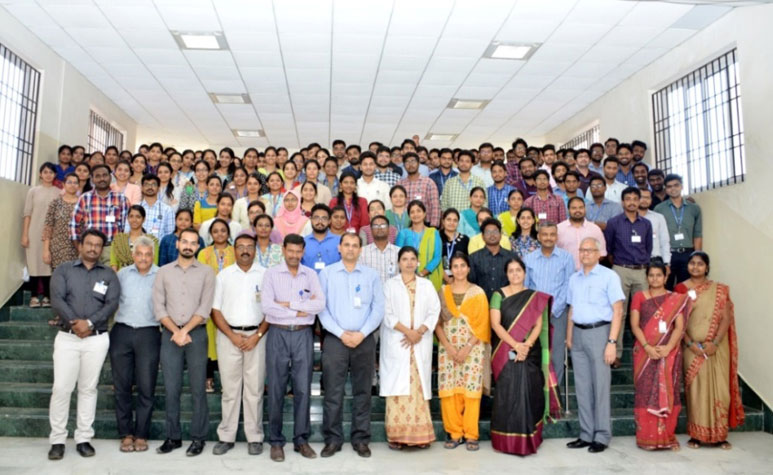Postgraduate Orientation Program



Organized by PG Curriculum Committee, Medical Education Unit
PG Curriculum Committee, Medical Education Unit organizes every year Orientation program for the newly joined Postgraduates with an objective to provide a basic overview on several aspects such as the Vision and Mission of SRIHER, About SRIHER, Rules and regulation of the university, introduction of the administrators of the university, Details of Post graduate competency based curriculum – overview of the three year program, Infrastructure details, facilities available in the hospital, Processes to be followed in the hospital such as indent reporting , informed consent, Credentialing, Pharmaco vigilance, Hospital administration, consumer rights and protection, E-Learning etc. Vice chancellor, Dean of Faculties, Dean of Medical college, Dean Education, Associate Deans of Post graduate studies welcome the students and interact with them and assure them on providing all the support they need for successful completion of postgraduation.
There is a soft skills session/AETCOM session in our program for Postgraduate students to enhance their soft skills, ethics, communication and overall professional etiquette. By conducting the PG orientation, we will be able to sensitize the students with what they can expect from us and what we expect from them and we provide them with a clear road map for their journey as PG in this campus covering academics, research opportunities, extracurricular activities and host of other support services. In the year 2020 due to the pandemic the program was conducted online and a session on Understanding the basics of COVID 19 was added which was well received and appreciated by the Post graduates. The students find the PG orientation program very useful and informative and have provided positive feedback.
RAPTS – RAMACHANDRA ANNUAL POSTGRADUATE TEACHING SKILLS WORKSHOP
Post graduate students serve as undergraduate medical students primary teachers especially for practical and clinical skills and more than 20% of the postgraduate's time is spent on teaching activities and provide 20–70% of clinical teaching for undergraduate medical students. Sensitizing the postgraduates on medical education principles is also the need of the hour as the undergraduate medical curriculum has undergone substantial revision in its methodology and is now competency based undergraduate medical curriculum incorporating several innovative teaching learning methods. Despite this critical role as teachers very few PG programs provide this kind of formal training in teaching methods, but our medical college has been a forerunner in medical education. Department of Physiology of Sri Ramachandra Medical College & Research Institute has taken the initiative of providing teaching skills training during the postgraduate training period itself as Postgraduates are the first teachers to the undergraduate students.
RAPTS (Ramachandra Annual Postgraduate Teaching Skills Workshop), as we have named it is to develop teaching skills in order to get the rapt attention of the UG students. Workshop for Postgraduates was conceptualized to train the medical postgraduates on medical education principles and skills. This workshop is the first of its kind to be undertaken by any medical college, targeting faculty development of postgraduates. This training program was initiated in the year 2014 and is going on successfully till date. This workshop is aimed at providing interactive scientific sessions and group activity sessions on key Medical Education topics that will promote teaching skills among postgraduate students and also to emphasize on motivation, Communication, team work and collaborative leadership that are some of the healthy trends in medical education.
The sessions of this workshop include importance of learning objectives and hands on session on preparation of learning objectives, different teaching learning methods with interactive demonstration of small group teaching as teaching techniques vary with content, venue, and group size. Use of different teaching learning methods and media, Learning styles in education, E-Learning as technology enables teaching and learning especially in current tech savvy students, Mentoring - ability to support, motivate, encourage and mentor students, and enthuse them about caring for patients, Good communication, including presentation and listening skills. This training workshop has an elaborate microteaching session, helping the postgraduates in improving their pedagogic skills. The session on reflection and feedback enhances self‐assessment, learning from experience and developing critical thinking skills. We have received appreciation and positive feedback from the students.
This training program will make a meaningful contribution to the scientific community by improving the teaching skills of postgraduate students of medical college who will become teaching faculty of several medical Colleges.
Related Links
EPABX : 044-24768027, 31-33
FAX : 044-24767008/24765995
Email : [email protected] / [email protected]






